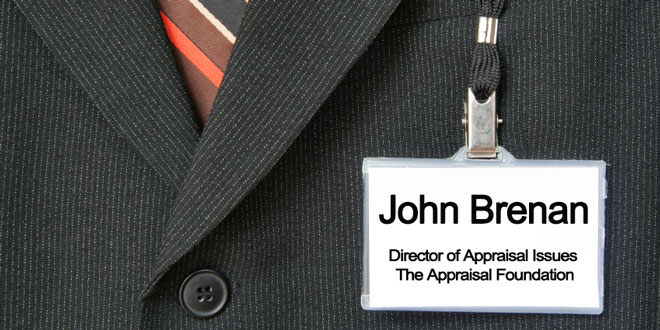An Interview with The Appraisal Foundation on Proposed Changes to the Real Property Appraiser Qualification Criteria
Last week the Appraiser Qualifications Board (AQB) of The Appraisal Foundation (Foundation) released the Third Exposure Draft of Proposed Changes to the Real Property Appraiser Qualification Criteria. The exposure draft discusses proposed modifications to:
- The College Degree Requirement for Licensed Residential and Certified Residential
- Practical Applications of Real Estate Appraisal
- Experience Requirements
John Brenan, Director of Appraisal Issues of The Appraisal Foundation, discusses the exposure draft with us in more detail.
Buzz: How has this exposure draft changed from the last exposure draft the AQB issued?
Brenan: A primary difference in the Third Exposure Draft of Proposed Changes to the Real Property Appraiser Qualification Criteria (Criteria) is the proposal to allow appraisal experience through the Practical Applications of Real Estate Appraisal (PAREA) program. The AQB is well aware of concerns voiced by many individuals who have experienced difficulty finding supervisory appraisers under the current “mentoring” model.
Those seeking a credential today encounter a very different environment than what many seasoned appraisers faced in the past—long gone are the days where financial institutions had in-house appraisal staff that would train someone to be an appraiser from the ground up, mentoring them over a period of years. Training a new generation of appraisers largely became the obligation of independent fee appraisers; however, concerns with expense, liability, and “training the competition” (among other factors) have greatly reduced the number of appraisers willing to train new appraisers. Finding willing supervisory appraisers in rural and underserved markets has been an even greater challenge, with these areas experiencing shortages of appraisers as has been widely publicized.
A recent study* conducted by the National Association of Realtors® found that less than one in five respondents currently train appraisers. When asked why those who had previously trained new appraisers stopped doing so, the study found that over 30% of the respondents felt it was too time consuming and too much work, or was not cost effective or worth the effort.
*Appraiser Trends Study, National Association of Realtors® Research Division, March 2017
Buzz: What does Practical Applications of Real Estate Appraisal do to address the issues with the current mentoring model?
Brenan: As proposed, PAREA would allow those individuals seeking a Licensed Residential or Certified Residential credential to receive up to 100% of the required experience in a structured learning environment. PAREA would allow individuals seeking a Certified General credential to receive up to 75% of the required experience.
The three PAREA modules being proposed have detailed outlines that must be followed in order to be eligible for experience credit. Each module would require completion of multiple appraisals that would have to be performed in compliance with the Uniform Standards of Professional Appraisal Practice (USPAP), involving actual and/or virtual properties.
Well-designed PAREA modules could offer training that most potential appraisers would not encounter in the traditional mentoring model. In addition, potential appraisers in rural and underserved markets would be able to obtain the required experience without trying to find supervisory appraisers that may be located several counties, or even states, from their home.
As proposed, all PAREA modules would have to be approved by The Appraisal Foundation to ensure they meet the outlines established by the AQB.
Buzz: PAREA sounds promising, but the AQB has allowed experience in the past via “practicum courses” and no such courses exist. How does this new concept differ?
Brenan: The biggest drawback for practicum courses as currently allowed under the Criteria is the considerable expense involved in developing such courses, considering the relatively small number of experience hours that could be obtained. The Criteria currently limits such experience to a maximum of 50% of the hours required for a credential. In addition, the amount of experience that could be awarded today equates to the number of hours a student actually spends performing the appraisal assignments. As a result, students today realistically may only receive 100 hours or less of experience in a practicum course.
PAREA is different because successful completion of a module will result in the individual receiving a large block of hours. For example, the AQB is proposing that completion of Module 1, Basic Practical Applications, would qualify for 1,000 hours of experience. If the AQB adopts the revisions to the experience requirements as proposed in Section 3 of the Third Exposure Draft, this would represent all of the experience needed to qualify for a Licensed Residential credential.
Buzz: What else is new in the Third Exposure Draft?
Brenan: The AQB had previously proposed changing the Bachelor’s Degree requirement for the Certified Residential classification to an Associate’s Degree. Based on the feedback received, the Board is proposing retaining the Bachelor’s Degree requirement. However, the AQB is now proposing a new option for experienced Licensed Residential appraisers to move up to the Certified Residential classification without a Bachelor’s Degree.
As proposed, Licensed Residential appraisers with at least three years of experience and no history of disciplinary sanctions would be able to alternatively satisfy the Bachelor’s Degree requirement by: 1) successfully completing at least 21 semester hours of college-level education in specific topic areas; or 2) successfully completing at least 21 hours of College Level Examination Program® (CLEP®) examinations in specific subject matter areas; 3) or a combination of the two.
As proposed in the Second Exposure Draft, the AQB continues to propose removal of the college-level education requirement for the Licensed Residential classification. The Board also continues to propose no changes to the Bachelor’s Degree requirement for the Certified General classification.
Buzz: When does the AQB anticipate adopting any proposed changes? When would the new requirements go into effect?
Brenan: The AQB is accepting written comments on the Third Exposure Draft through May 12, 2017, so no action by the Board is possible prior to that date. The Board will also be accepting verbal comments at its public meeting in Tampa, Florida on April 7, 2017. The public meeting is being held in conjunction with a meeting of the Association of Appraiser Regulatory Officials (AARO), where many states will be represented. The AQB intends to seek feedback from the various states regarding potential implementation issues.
The AQB would like any revisions adopted to become effective as quickly as possible, but it’s vitally important that the proposed changes are fully vetted to avoid any potential unintended consequences. Having said that, the Board anticipates that any changes adopted would not go into effect any sooner than January 1, 2018.
Buzz: Where can I read the Third Exposure Draft and how can I submit my comments?
Brenan: The Third Exposure Draft can be found on The Appraisal Foundation’s website HERE.
Written comments may be submitted via email to AQBcomments@appraisalfoundation.org.
[divider]
Have content of your own that you would like to submit? Email comments@appraisalbuzz.com.








